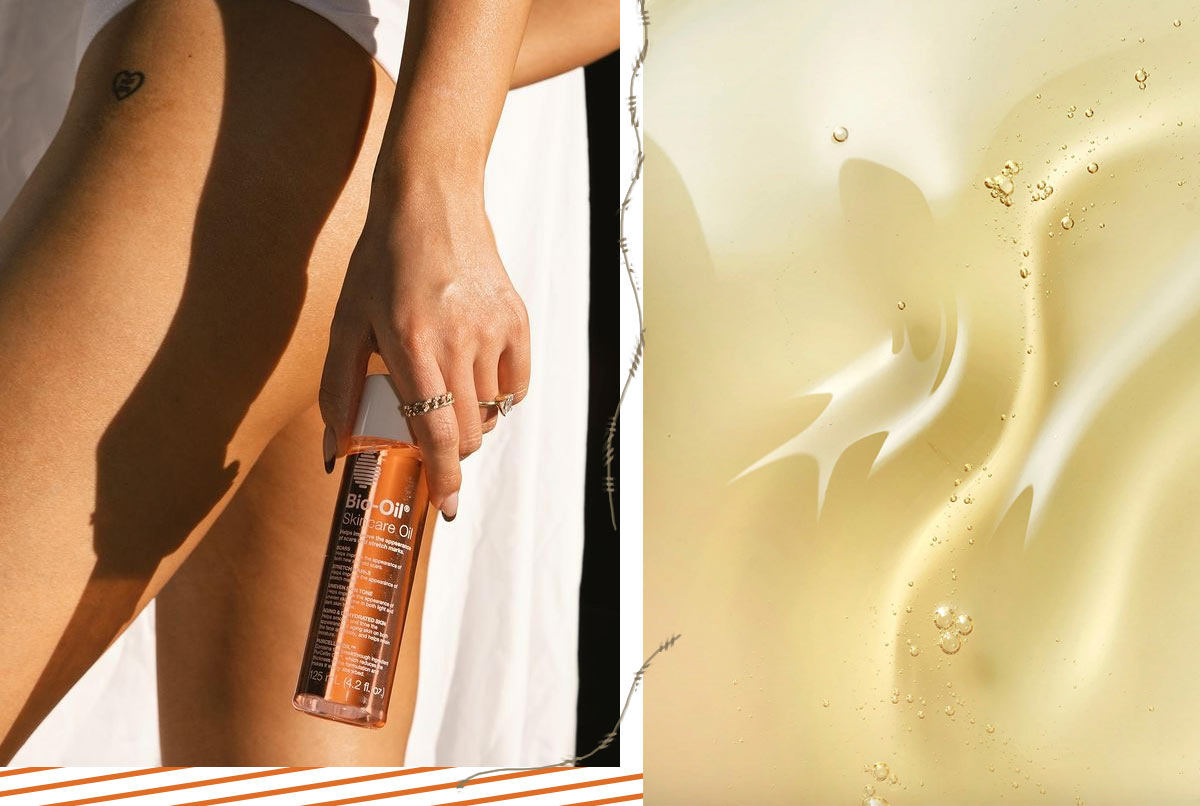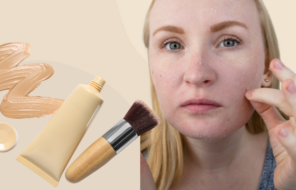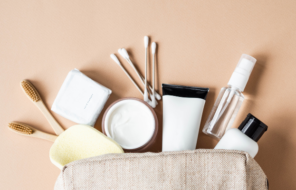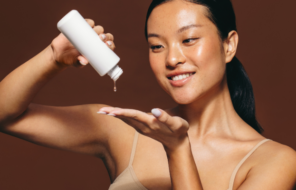Are you ready to slip into something sexy? We think body oil might be just what you need. Body oil is, hands down, the most seductive of all body care products. Something about that slippery texture and natural sheen is alluring, whether it’s sitting in a pretty bottle or being smoothed onto the skin.
So what are body oils made of, anyway, and how do they compare to other common body moisturizers, like creams and lotions? We’ve got all the answers for you.
In this article, we’ll celebrate body oils for all of their unique benefits. We’ll cover exactly what makes them different from body creams. Finally, we’ll give you some important tips for how to use body oil, so you can get the most out of the one you choose.
In this article:
What Is Body Oil?
First and foremost, let’s talk about what a body oil is for, anyway, and what it’s made of. Body oils are waterless skincare formulations that are usually made out of plant oils, although occasionally, they can be made of other oil-like substances.
They are designed to be applied to the skin on the body, just like a moisturizer. Once applied, they do an excellent job of smoothing and softening the skin while also helping to lock moisture into place.
Each body oil formula can also have its own very unique properties, depending on the kinds of oils and lipids used in its making. For example, a body oil made with almond or coconut oil will be a little greasier but rich in beneficial natural compounds. On the other hand, a body oil made with fluid silicones will have a very light, silky texture and strong moisture-binding effects but no added antioxidants.
Many body oils combine both natural plant oils and lab-enhanced or synthetic texture enhancers in order to get the best of both worlds: a lightweight, non-greasy formula that also reinforces the skin with antioxidant compounds that have a protective, anti-aging effect on the skin.
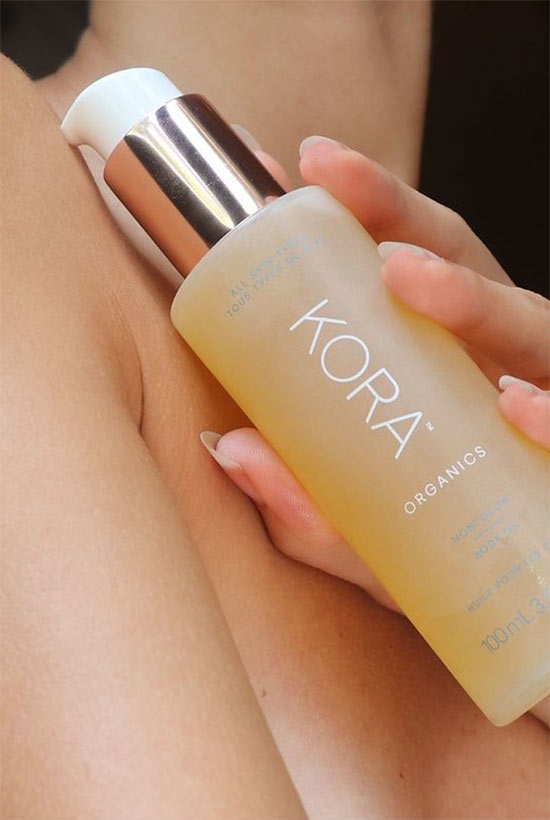
Body Oil Benefits
We’ve already touched on this a little, but let’s get into the main body oil benefits, one by one!
Skin-Softening
The main feature of body oils is that they’re highly emollient. An emollient is an important cosmetic ingredient, which is able to soften the skin, usually by filling in any gaps between the dead skin cells that make up the very top layer of the skin. This is especially helpful for those who have dry, rough skin, but it’s beneficial to everyone.
Some emollients can sink a little more deeply into the skin, while others stick around on the surface. Pretty much across the board, they all help to give the skin a smoother, softer feel.
Moisture-Sealing
The next benefit of body oils is that they can seal moisture into the skin, which makes them a nice option for moisturization. This kind of effect is called “occlusion,” which means that the oil creates a layer over the skin through which moisture cannot escape.
This is especially lovely after a bath or shower when the skin is saturated with water that’s ready to evaporate. The body oil keeps that moisture locked in place, which keeps the skin hydrated for longer.
Almost all oils have some moisture-sealing effects, but some are better at it than others. In general, most plant oils are less occlusive than mineral oil, so natural body oils are rarely the best occlusives. If your main goal is to lock as much moisture into your skin as possible, look for a body oil with mineral oil, or consider trying a body butter instead.
Anti-Aging Antioxidants
If you care at all about premature aging on your body, antioxidants are a must-have in your beauty routine (along with regular sunscreen use). The reason why antioxidants are so great is a little complex, so we’ll try to keep it simple: the antioxidants prevent the oxidative process that breaks down the skin and speeds up the aging process.
This oxidative process is usually a result of free radicals, which are unstable atoms generated by the sun’s rays and pollutants. Okay, maybe it’s not so simple. Just take our word for it: having antioxidants in your beauty routine is very helpful!
In body oils, the antioxidants are usually naturally present in plant oils. The range of antioxidants you can find is quite large, from vitamin E to beta carotene to a whole range of polyphenols and other phytonutrients that’ll keep your skin looking youthful.

Glow-Giving
The biggest and most unique benefit to massage oils is the level of glow they can give to the skin! Oils naturally reflect light, leaving the skin with a sexy, irresistible sheen. Depending on your body oil, it may last for a few hours, although lighter, quick-sinking body oils may only leave a sheen for a few moments.
Some body oils are even infused with reflective mineral particles, so they double as body makeup to give the skin a dramatic highlight.
Massage-Enhancing
Who doesn’t love a body massage? A good massage can alleviate muscle tension, help you relax, and depending on who does it, it can also be a great moment of intimacy. Body oils are fantastic for enhancing a body massage since they add slip, allowing the person doing the massage to apply more pressure without tugging on the skin. In general, slightly heavier body oils are better for the job since they stay on the surface of the skin for longer.
Perfume Substitute
A lot of body oils are scented with truly marvelous fragrances. Oils do a great job of holding on to fragrance molecules, so they can make you smell truly lovely. The scent doesn’t emanate as strongly or for as long as it would from an alcohol-based perfume.
This makes it a nice, light substitute for environments where a full-on perfume isn’t appropriate. Your body oil can also act as a fixative base to your perfume, as long as the two fragrances are complementary.
Not Just for the Skin!
The skin is not the only part of the body that benefits from oils! In general, it’s better not to use body oil on the face. The fragrance level is usually too strong, and the oils can be comedogenic, although there are plenty of unscented and non-comedogenic exceptions to the rule.
However, the hair can really benefit from body oil, especially as a pre-shower treatment. Some oils, like coconut oil, can penetrate into the hair to fortify it from within, while others help to coat the surface of the hair and smooth the cuticles, which makes the hair a little stronger and more resistant to damage. If your oil has a nice fragrance, it also gives your hair that gorgeous scent.
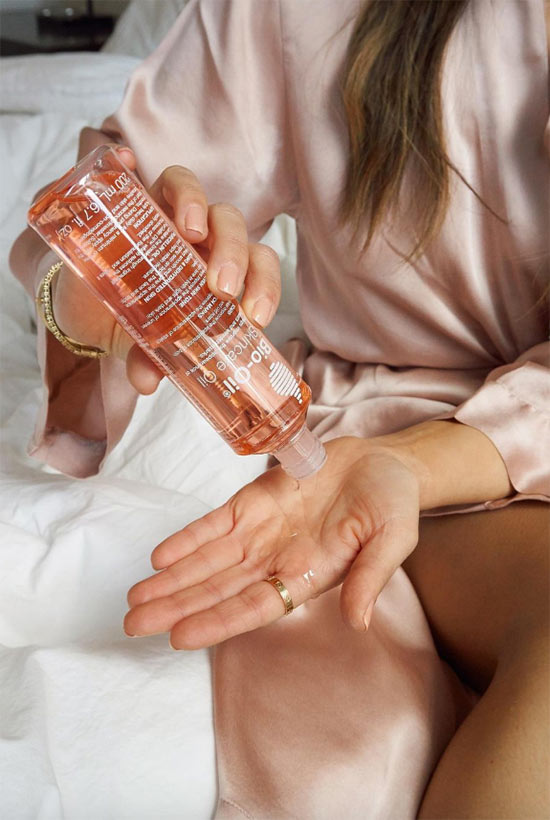
Body Oil vs. Body Cream
Body oils are not as mainstream as body creams, so it’s easy to get confused about which to use. Do you need both? Is one better than the other? As is usually the case with skincare, it really depends!
As a rule, body creams are the more comprehensive option for keeping your body moisturized. They contain oils (or at least, emollients), just like body oils, but they also contain water and ingredients that bind to water and help pull it into the skin (we call them humectants). Because of that, if your skin is prone to dehydration, it’s important to keep a body cream or lotion around to use during the day when your skin gets dry.
Body oils work best immediately after a shower when the skin is already loaded with water that just needs to be locked in. If your skin is oily, body oil can do that nicely without feeling as heavy as body butter!
Finally, body oils are a nice choice when you’re looking for a cosmetic effect. They provide the skin with longer-lasting shine and a stronger fragrance than lighter body creams, which are quicker to dissipate into the skin.
You can also use body oil in addition to your body cream or lotion. After applying your lighter body care product, the body oil will help add more sheen to your skin. It will also do a nice job of sealing in the great ingredients in your lotion.
How to Use Body Oil
Applying body oil isn’t particularly complicated, but we still have a few tips to help you get the most out of your product!
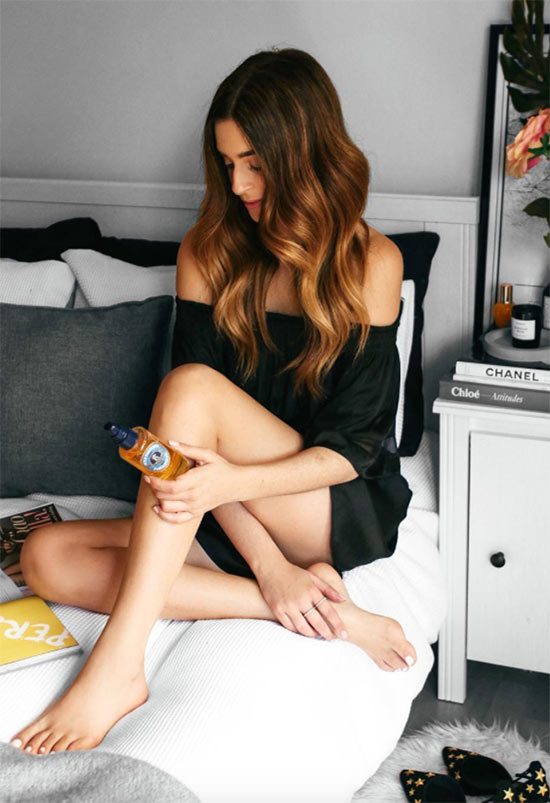
- For the best results, hop in the shower. Bonus points if you lightly exfoliate your skin with a body scrub or exfoliating glove.
- Once you finish your shower, gently dry your skin by simply dabbing your towel against your skin. Don’t rub too harshly, and keep your skin a little damp.
- Then, dispense a small amount of body oil in your palm – don’t apply too much, or it might slip from your hand to the floor, where it can become a safety hazard.
- Start massaging it into your skin in gentle, circular motions. The more you massage it in, the more quickly it’ll penetrate into your skin.
- Pour more body oil in your palm as necessary, if you feel you need more.
- If you’re nervous about making a mess, you can stay in the shower or bath to apply your body oil. Just be very careful not to spill any, as things can get slippery.
- Wait for the body oil to sink in a little bit before putting your clothes on, or else you might end up with some stains.
- If you’d like to use both a body oil and a body moisturizer, always apply the body oil as a final step.
- Also, consider applying your body oil to your legs, collarbone, and arms before special events where you’ll be showing a bit of skin.
Photos via @ellenvlora, Instagram

